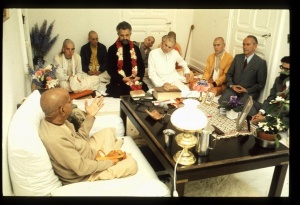CC Madhya 17.36: Difference between revisions
m (1 revision(s)) |
No edit summary |
||
| Line 1: | Line 1: | ||
{{ | [[Category:Sri Caitanya-caritamrta - Madhya-lila Chapter 17|C036]] | ||
<div style="float:left">'''[[Sri Caitanya-caritamrta|Śrī Caitanya-caritāmṛta]] - [[CC Madhya|Madhya-līlā]] - [[CC Madhya 17|Chapter 17: The Lord Travels to Vṛndāvana]]'''</div> | |||
<div style="float:right">[[File:Go-previous.png|link=CC Madhya 17.35|Madhya-līlā 17.35]] '''[[CC Madhya 17.35|Madhya-līlā 17.35]] - [[CC Madhya 17.37|Madhya-līlā 17.37]]''' [[File:Go-next.png|link=CC Madhya 17.37|Madhya-līlā 17.37]]</div> | |||
{{CompareVersions|CC|Madhya 17.36|CC 1975|CC 1996}} | |||
{{RandomImage}} | |||
==== TEXT 36 ==== | ==== TEXT 36 ==== | ||
<div | <div class="verse"> | ||
dhanyāḥ sma mūḍha-matayo ’pi hariṇya etā | :dhanyāḥ sma mūḍha-matayo ’pi hariṇya etā | ||
yā nanda-nandanam upātta-vicitra-veśam | :yā nanda-nandanam upātta-vicitra-veśam | ||
ākarṇya veṇu-raṇitaṁ saha-kṛṣṇa-sārāḥ | :ākarṇya veṇu-raṇitaṁ saha-kṛṣṇa-sārāḥ | ||
pūjāṁ dadhur viracitāṁ praṇayāvalokaiḥ | :pūjāṁ dadhur viracitāṁ praṇayāvalokaiḥ | ||
</div> | </div> | ||
| Line 14: | Line 18: | ||
==== SYNONYMS ==== | ==== SYNONYMS ==== | ||
<div | <div class="synonyms"> | ||
''dhanyāḥ''—fortunate, blessed; ''sma''—certainly; ''mūḍha-matayaḥ''—foolish, without good sense; ''api''—although; ''hariṇyaḥ''—she-deer; ''etāḥ''—these; ''yāḥ''—who; ''nanda-nandanam''—the son of Mahārāja Nanda; ''upātta-vicitra-veśam''—dressed very attractively; ''ākarṇya''—hearing; ''veṇu-raṇitam''—the sound of His flute; ''saha-kṛṣṇa-sārāḥ''—accompanied by the black deer (their husbands); ''pūjām dadhuḥ''—they worshiped; ''viracitām''—performed; ''praṇaya-avalokaiḥ''—by their affectionate glances. | |||
</div> | </div> | ||
| Line 21: | Line 25: | ||
==== TRANSLATION ==== | ==== TRANSLATION ==== | ||
<div | <div class="translation"> | ||
“‘Blessed are all these foolish deer because they have approached Mahārāja Nanda’s son, who is gorgeously dressed and is playing on His flute. Indeed, both the does and the bucks worship the Lord with looks of love and affection.’” | “‘Blessed are all these foolish deer because they have approached Mahārāja Nanda’s son, who is gorgeously dressed and is playing on His flute. Indeed, both the does and the bucks worship the Lord with looks of love and affection.’” | ||
</div> | </div> | ||
| Line 28: | Line 32: | ||
==== PURPORT ==== | ==== PURPORT ==== | ||
<div | <div class="purport"> | ||
This is a verse from Śrīmad-Bhāgavatam ([[SB 10.21.11]]) spoken by the gopīs of Vṛndāvana. | This is a verse from ''Śrīmad-Bhāgavatam'' ([[SB 10.21.11]]) spoken by the ''gopīs'' of Vṛndāvana. | ||
</div> | </div> | ||
__NOTOC__ | |||
<div style="float:right; clear:both;">[[File:Go-previous.png|link=CC Madhya 17.35|Madhya-līlā 17.35]] '''[[CC Madhya 17.35|Madhya-līlā 17.35]] - [[CC Madhya 17.37|Madhya-līlā 17.37]]''' [[File:Go-next.png|link=CC Madhya 17.37|Madhya-līlā 17.37]]</div> | |||
__NOTOC__ | |||
__NOEDITSECTION__ | |||
Revision as of 17:03, 17 October 2021

A.C. Bhaktivedanta Swami Prabhupada
TEXT 36
- dhanyāḥ sma mūḍha-matayo ’pi hariṇya etā
- yā nanda-nandanam upātta-vicitra-veśam
- ākarṇya veṇu-raṇitaṁ saha-kṛṣṇa-sārāḥ
- pūjāṁ dadhur viracitāṁ praṇayāvalokaiḥ
SYNONYMS
dhanyāḥ—fortunate, blessed; sma—certainly; mūḍha-matayaḥ—foolish, without good sense; api—although; hariṇyaḥ—she-deer; etāḥ—these; yāḥ—who; nanda-nandanam—the son of Mahārāja Nanda; upātta-vicitra-veśam—dressed very attractively; ākarṇya—hearing; veṇu-raṇitam—the sound of His flute; saha-kṛṣṇa-sārāḥ—accompanied by the black deer (their husbands); pūjām dadhuḥ—they worshiped; viracitām—performed; praṇaya-avalokaiḥ—by their affectionate glances.
TRANSLATION
“‘Blessed are all these foolish deer because they have approached Mahārāja Nanda’s son, who is gorgeously dressed and is playing on His flute. Indeed, both the does and the bucks worship the Lord with looks of love and affection.’”
PURPORT
This is a verse from Śrīmad-Bhāgavatam (SB 10.21.11) spoken by the gopīs of Vṛndāvana.